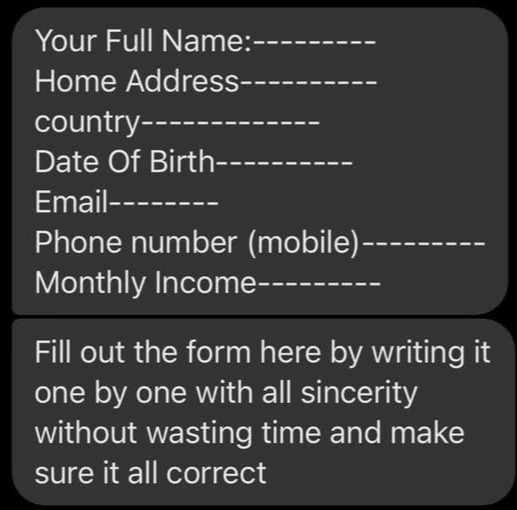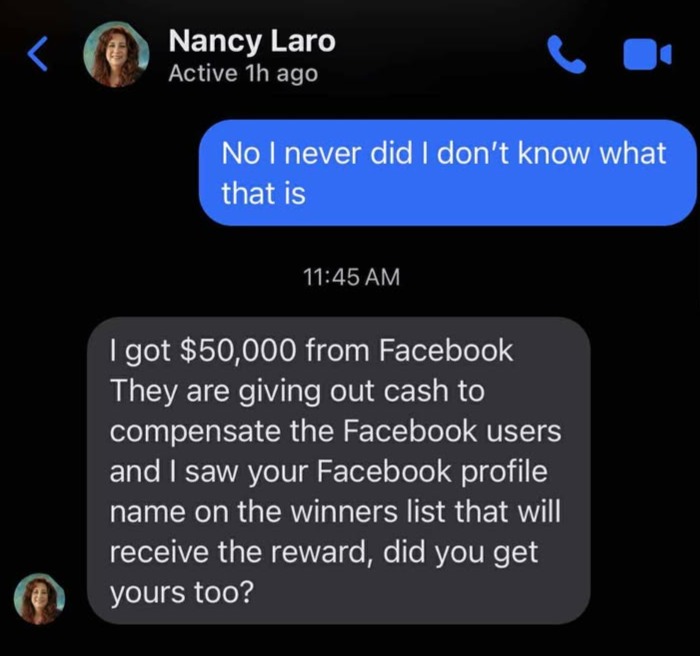 On a quiet evening in Ontario, John M., a 30-year-old construction worker, accepted what appeared to be a harmless Facebook friend request. Within minutes, he received a message from the new contact claiming he had just received $50,000 from Facebook as part of a compensation program. The message was casual—“Did you get yours too?”—and included a link to a page styled after Meta’s official website. Trusting the interaction, John provided his personal details. Days later, he discovered multiple unauthorized withdrawals from his bank account.
On a quiet evening in Ontario, John M., a 30-year-old construction worker, accepted what appeared to be a harmless Facebook friend request. Within minutes, he received a message from the new contact claiming he had just received $50,000 from Facebook as part of a compensation program. The message was casual—“Did you get yours too?”—and included a link to a page styled after Meta’s official website. Trusting the interaction, John provided his personal details. Days later, he discovered multiple unauthorized withdrawals from his bank account.
John’s story is not unique. Across North America, Europe, Asia, and beyond, users are reporting similar approaches. This so-called Facebook compensation scam has become one of the most adaptive and widespread fraud campaigns currently targeting social media users.
🕵️ Anatomy of the Scam
The scam is designed around familiarity and credibility, exploiting both Facebook’s platform features and human psychology.
🔎 The Entry Point – Victims receive a friend request from a cloned or fabricated profile.
💬 The Bait – The scammer claims they are on a “winners list,” framing the interaction casually to reduce suspicion.
🎣 The Hook – A supposed payout of $50,000 is dangled as a reward for loyalty or participation in a settlement.
💳 The Exploitation – Victims are directed to fake Meta Pay portals, phishing forms, or asked for “processing fees” and personal data.
Unlike traditional spam, these messages arrive through a platform many people associate with friends and family, giving them a dangerous sense of authenticity.
🌍 A Global Operation
The scam has proven highly adaptable, tailoring itself to local contexts:
🇺🇸 United States – Criminals cite real Meta privacy settlements, requesting Social Security numbers “for tax purposes.”
🇨🇦 Canada – Messages reference loyalty programs, sometimes impersonating the CRA to appear official.
🇬🇧 UK – Fraudsters deploy fake Meta Pay portals designed to resemble GDPR-compliant sites.
🇦🇺 Australia & Asia – The pitch is localized into local currencies and often merged with fake job or survey offers.
📌 Case Example: London, UK – A university student reported losing £1,200 after being told to pay “release fees” to claim a Meta compensation prize. The scammer used a cloned profile of one of his classmates to establish trust.
📌 Case Example: Sydney, Australia – A retired teacher was tricked into sharing banking credentials through a fake survey tied to the compensation scheme. Funds were siphoned out of her account within 24 hours.
📊 The Numbers Behind the Scam
While official figures are difficult to compile since many victims never report cybercrime agencies note a sharp rise in fraud tied to social media impersonation scams.
🇺🇸 FTC (US) – Reported losses from social media fraud exceeded $2 billion in 2023, with phishing through Facebook and Instagram among the top methods.
🇬🇧 UK Action Fraud – Over 45,000 reports of social media impersonation scams were filed in 2024 alone, costing victims an estimated £180 million.
🇦🇺 Australia’s ACCC – The Scamwatch program recorded $92 million in losses linked to identity theft scams on social media in 2024.
These figures confirm what experts have long feared: scammers are shifting away from email spam toward direct social platforms, where trust and speed make users more vulnerable.
⚠️ Why the Scam Persists
 The scam thrives due to Facebook’s large user base and features like public profiles that enable easy cloning. Scammers exploit psychological triggers greed for winnings and trust in "friends" amplified by algorithms promoting connections. The similarity to cloning scams enhances longevity: cloning provides a low-effort entry, while compensation claims scale the lure. Many users keep friends lists public, fueling the cycle, and Meta’s genuine creator programs create confusion, as scammers mimic these opportunities. Evolving tech, like AI-generated messages, complicates detection, allowing cross-border operations.
The scam thrives due to Facebook’s large user base and features like public profiles that enable easy cloning. Scammers exploit psychological triggers greed for winnings and trust in "friends" amplified by algorithms promoting connections. The similarity to cloning scams enhances longevity: cloning provides a low-effort entry, while compensation claims scale the lure. Many users keep friends lists public, fueling the cycle, and Meta’s genuine creator programs create confusion, as scammers mimic these opportunities. Evolving tech, like AI-generated messages, complicates detection, allowing cross-border operations.
The legitimate creator payment program’s application process contrasts sharply with these scams. Since Meta requires pages with 10,000+ followers to opt in and meet specific criteria without outreach, unsolicited messages claiming eligibility are a clear red flag. Scammers exploit this gap, banking on victims’ unawareness of the official process.
Several factors contribute to its ongoing success:
💻 Platform Scale – Facebook has billions of users, providing scammers with a vast pool of potential targets.
🧠 Emotional Manipulation – The promise of a large payout taps into hope, curiosity, and greed, making users more likely to overlook warning signs.
🌀 Legitimacy Confusion – By mimicking Meta’s real programs, such as Creator Rewards or Reels Bonuses, scammers make their approach appear credible.
🤖 Technology Tools – Fraudsters increasingly use AI-generated messages and localized language to make scams more convincing and harder to detect.
Because the scam blends social familiarity, realistic visuals, and references to legitimate programs, it is effective at convincing users that the interaction is genuine, which is why it continues to persist globally.
🛡️ Protecting Yourself
 Scrutinize friend requests: only accept known contacts and verify via other channels if unsure. Set privacy settings to limit your friends list and profile visibility, reducing cloning risks. Never respond to unsolicited prize or compensation claims; Meta does not notify via Messenger; check Creator Studio or the Help Center for legitimate updates. For creator payments, apply through official channels if eligible (10,000+ followers, meeting criteria), and avoid sharing details outside these platforms. Block and report suspicious profiles via Messenger, inform your network if cloned, and enable two-factor authentication.
Scrutinize friend requests: only accept known contacts and verify via other channels if unsure. Set privacy settings to limit your friends list and profile visibility, reducing cloning risks. Never respond to unsolicited prize or compensation claims; Meta does not notify via Messenger; check Creator Studio or the Help Center for legitimate updates. For creator payments, apply through official channels if eligible (10,000+ followers, meeting criteria), and avoid sharing details outside these platforms. Block and report suspicious profiles via Messenger, inform your network if cloned, and enable two-factor authentication.
👥 Friend Requests – Only accept people you can verify.
🔒 Privacy Controls – Hide your friends list to reduce cloning risks.
🚫 No Messenger Prizes – Meta does not distribute rewards through chat.
📲 Official Verification – Real monetization is only handled through Creator Studio/Business Suite and even then only if certain conditions have been met (10K Followers, certain number of Live Videos etc).
📢 Report Scammers – Block suspicious accounts and alert Facebook.
🛑 Strengthen Security – Use two-factor authentication and monitor login alerts.
📡 Seek Help – Report fraud to the FTC (US), ACCC (Australia), Action Fraud (UK), or your national cybercrime unit.
The Facebook compensation scam is a reminder that fraud adapts as quickly as technology. By exploiting platform design, human trust, and legitimate corporate programs, scammers have built a scheme that feels plausible enough to ensnare victims across continents.
The key takeaway is simple: if you are promised money from Meta through Messenger, it is a scam. Legitimate Meta payments are limited to verified creators who meet strict eligibility criteria and are never initiated through unsolicited chats.
As digital crime continues to grow, awareness is the most powerful defense. By understanding how these scams work—and spreading that knowledge to friends, family, and colleagues users can help close the door on one of the most pervasive social media frauds of our time.
- Log in to post comments
